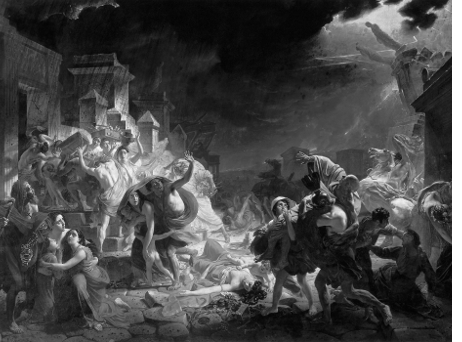The Last Days Part 4
© 10.20.16 By David Eric Williams
 Our Old Testament selections from a few weeks ago concerning "the end" made it clear the prophets were talking about judgment that took place during the course of normal human history. Isaiah spoke about judgment upon Babylon at the hand of the Medes and Persians. Jeremiah was speaking of the overthrow of Judah and Jerusalem by the Babylonians. Ezekiel prophesied about the Babylonian overthrow of Judah and Egypt (elsewhere he prophecies about Edom, and Ammon as well, again using "end time" language). Obadiah spoke of Edom falling to the Babylonians and Zephaniah spoke of Judah suffering the same fate. Each prophet is speaking about events that took place within decades of the original pronouncement. Isaiah is the only one who prophesied about an event that took place more than a generation after he spoke (concerning the overthrow of Babylon by the Medes and Persians about 150 years later). Ezekiel prophesied about an end that came to pass within 10 years of his announcement. Obadiah spoke of an event that may have taken place 80 years later, but the other prophecies are about "last days" that were accomplished within a generation of the original audience.
Our Old Testament selections from a few weeks ago concerning "the end" made it clear the prophets were talking about judgment that took place during the course of normal human history. Isaiah spoke about judgment upon Babylon at the hand of the Medes and Persians. Jeremiah was speaking of the overthrow of Judah and Jerusalem by the Babylonians. Ezekiel prophesied about the Babylonian overthrow of Judah and Egypt (elsewhere he prophecies about Edom, and Ammon as well, again using "end time" language). Obadiah spoke of Edom falling to the Babylonians and Zephaniah spoke of Judah suffering the same fate. Each prophet is speaking about events that took place within decades of the original pronouncement. Isaiah is the only one who prophesied about an event that took place more than a generation after he spoke (concerning the overthrow of Babylon by the Medes and Persians about 150 years later). Ezekiel prophesied about an end that came to pass within 10 years of his announcement. Obadiah spoke of an event that may have taken place 80 years later, but the other prophecies are about "last days" that were accomplished within a generation of the original audience.
Clearly, when the prophets said the end was near, they did not mean the end of human history. They meant God was bringing an end to the (then) current state of affairs through temporal judgment. Moreover, the judgments came in the form of foreign conquering armies. So, in the Old Testament end time passages we have examined, God said he was bringing judgment quickly and in each case that's exactly what he did. Thus, there are two points we must keep in mind as we apply what we have learned to our new testament passages: one, "the end" and similar language does not always mean the end of human history, and two, when God says the end is "near," he means exactly that.
Since a physical second coming of Jesus did not take place in the first century and since it is not normal biblical language to say an event that will take place thousands of years in the future is "near," we are best served to allow the Bible to speak for itself. The language used in the Old Testament passages we examined is like the language in the New Testament passages noted earlier. The Old Testament passages we examined refer to an end, of sorts, that (typically) took place within a generation of the actual utterance of the prophecies. Jesus said an end, of sorts, would take place within a generation of his Olivet Discourse. The Old Testament prophets used no special language to tag their predictions as being near at hand as they plainly said they were. Conversely, the New Testament writers we looked at used no special language to label their words as having a meaning much different from what would be expected. And using Scripture to interpret Scripture, we see no reason to understand the New Testament "near end" passages differently than we understand similar Old Testament passages. In other words, the New Testament writers said an end of some kind was soon to take place and that is exactly what they meant.
More on this next week.
Entire Site Copyright © 2025 By David Eric Williams










